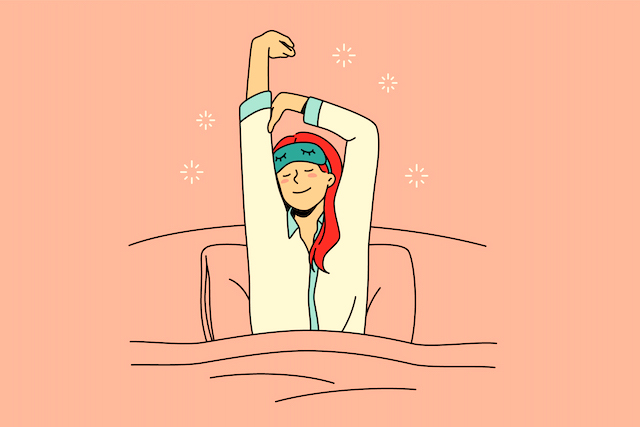
“You create your future based on your energy in the present.” ~Unknown
I’m usually a pretty happy person, but about a year ago—perhaps due to a lack of social connections and laughter—I experienced a few dark months. During those months, I spent most of my waking hours (and probably nights as well) consumed with negative thoughts.
I woke up feeling angry in the morning, continued having negative thoughts most of the day, and went to bed in that same state of mind.
Luckily, I didn’t have many opportunities to spread my negativity to others because we were in confinement.
On one of those moody mornings, I played a video of a spiritual teacher that a friend had recommended listening to while getting ready for the day.
Halfway through the video, he said, “Humanity is ascending into more loving and conscious states of being. You are becoming more of who you truly are, which is love.”
At that moment, I caught my eyes in the mirror and stared at my unhappy face.
“I’m not ascending. I’m descending further and further into the ‘hell’ in my own mind.”
My negativity was eating me alive, but, strangely, it was so addictive.
Since it had been escalating for some time (a few months by then) and had acquired a good bit of momentum, I really didn’t know if I’d be able to shift all that negativity into a more positive state of being. I knew that the longer I waited, though, the harder it would be.
Still looking at my face in the mirror, I noticed the corners of my mouth pointing slightly downward.
“If I continue like that, I’m going to get grumpy face wrinkles.”
I made my bed and then went to the kitchen. As the coffee was brewing, I grabbed my laptop and Googled “how to be a more positive person,” and I scribbled down a few ideas that resonated with me.
Later that day, after mixing and matching advice from different articles, I created what I called my “emotional hygiene routine.”
It’s a series of simple habits that I committed to doing most days of the week for an entire month (and still continue to do today on most days) and that, over that month, took me out of my depressive state and made me wake up smiling in the morning again.
I’d like to share them with you.
1. Fall asleep in the “vortex.”
One idea I came across in my research on being more positive came from Abraham Hicks:
“If you go to sleep in the vortex, you wake up in the vortex. If you go to sleep not in the vortex, you wake up not in the vortex.”
Being in the “vortex” refers to a state of pure positive energy. The idea in that quote is pretty straightforward: go to bed thinking positive thoughts and feeling happy feelings, and you’re more likely to wake up thinking and feeling positive in the morning.
I knew this had to be true. I knew it because when I went to bed thinking angry thoughts, I usually dreamed that I was unhappy and then woke up grumpy (and exhausted) in the morning.
So, I decided to try something. As I closed my eyes to sleep at night, I scanned the day from the moment I woke up until the present moment when I was lying in bed, and I tried to recall all the positive things (even tiny things) that had happened that day.
I could have thought about the delicious mocha latte that I drank that morning, the fact there wasn’t snow on the ground and that I was able to run outside in the afternoon, or a nice comment someone left on one of my videos.
I spent a few seconds remembering a happy moment before moving on to the next one. After scanning the entire day, I would do it again, trying to find even more subtle positive things, and I did this until I fell asleep.
This exercise is probably the number one thing that helped me (and still continues to help me) wake up happier in the morning.
2. Have something to look forward to on the following day.
Something else that has helped me wake up happier is having something to look forward to every day, even if I have a busy day ahead and have minimal free time available.
Still to this day, every evening, I schedule at least one activity that brings me joy for the following day. It can be going for a walk with a friend, baking cookies, or watching the sunset. It can also be as simple as wearing my favorite outfit.
Scheduling one activity that brings me joy for the following day gives my mind something fun to anticipate and puts me in a good mood in the evening.
And again, how the day ends is a good indicator of how the following day begins.
3. Absorb uplifting ideas in the evening.
We all know that what we feed our minds affects our mood. I don’t have a TV and don’t follow the news, but my Facebook feed is often enough to get me irritated. So, I decided to stop scrolling mindlessly on Facebook (or at least do so less often) and consume positive-only content instead.
For the past few months, first thing in the morning and before going to bed, I’ve been reading a few pages of an inspiring book—usually something spiritual. I just finished reading the entire Earth Life book series by Sanaya Roman, and right now, I’m reading Wishes Fulfilled by Wayne Dyer.
Reading those kinds of books brings me peace. I can notice a significant difference in my mood and stress level if I just take even fifteen minutes to consume uplifting content in the morning and evening.
(If you have any book recommendations, you can share them in the comments.)
4. Make a gratitude list—with a twist.
After reading in the morning, I write down three to five things I’m grateful for—and why I appreciate each thing.
I used to write gratitude lists of fifteen-plus items and do it very quickly—almost mindlessly—just to “get it done.” It made the practice sort of mechanical and not very effective.
I’ve found that writing fewer items on my list and taking the time to dive into the reasons each thing makes me happy intensifies the feelings of gratitude and makes the exercise more profound. I try to do this daily, although I do forget sometimes. When I forget several days in a row, I can feel the difference in my general mood.
Gratitude is perhaps the lowest-hanging fruit for cultivating a more positive attitude.
5. Choose your state of being as you open your eyes.
The last thing that has helped me is a piece of advice from Dr. Daniel Amen, one of the leading brain health experts. In an interview on The School of Greatness Podcast, he talked about the importance of setting a positive intention from the very start of the day to cultivate what he calls “a positivity bias.”
An affirmation he uses himself and recommends using is: “Today is going to be a great day.”
When we tell ourselves this in the morning, our unconscious mind then looks for things that are going right to prove that this is true. This isn’t toxic positivity—ignoring or denying the negative. It’s training our brains to see what’s positive instead of focusing on the negative by default.
I’ve taken the habit of saying this affirmation (or a similar one) just after waking up and before opening my eyes in the morning. It’s a bit like choosing and declaring from the very start of the day what attitude you’ll adopt that day. It’s easy to do, and it sets the tone for the day.
In the beginning, I didn’t always remember to declare my intention until later in the morning, but it didn’t take long before it became automatic. Now, just remembering to think about my intention (and then mentally saying it) makes me smile as I wake up.
. . .
Our lives don’t need to be perfect to wake up smiling in the morning; they just require a conscious effort to develop a positive attitude, which is what the five habits in this article have helped me accomplish.
I hope they serve you well, too, if you choose to implement them.
About Emilie Pelletier
Emilie is a certified coach specializing in positive psychology, a spiritual entrepreneur, and a creator. She helps people gain clarity on their purpose, create their life’s work, and pursue their goals and dreams with clarity and confidence. You can get her FREE JOURNALS—The Soulful Bucket List Journal, The Blissipline Journal for Daily Happiness, andThe Life Purpose Formula—or connect with her through her website.













 Though I run this site, it is not mine. It's ours. It's not about me. It's about us. Your stories and your wisdom are just as meaningful as mine.
Though I run this site, it is not mine. It's ours. It's not about me. It's about us. Your stories and your wisdom are just as meaningful as mine.
Great post Emilie! Growing up with a pessimistic mother… who always looked for the negative or bad in everything… I never understood why she just couldn’t be happy. Happy within all the bad things going on… Happy in spite of all the negativity. I really do believe that you can “choose to be happy”. It’s all a matter of perspective. And no… this doesn’t mean it’s easy or that life never gets you down or doesn’t overwhelms you. It just means that you choose to look at what’s happening in a positive light. When I became overwhelmed by chronic pain and exhaustion… I started with the “Today is going to be an amazing day!” comment. And I love that you went one step farther with your gratitude journal…. the “why” you are grateful. I love your practice of going to bed reviewing the positive events in your day. Admittedly… those are the times I rehash everything that went wrong and figure out how to make them right….takes me a long time to fall asleep… lol! So…. that will become my new practice… replaying all the little “sparks of joy” that I had during the day. One wonderful spiritual fiction novel I’ve read a few times… “The Daughter’s of Joy” by Deepak Chopra. Blessings to you Emilie 🕉 💕
Thank you so much for sharing, Deanne! I believe happiness is a “practice” more than anything else. I had never heard of that book by Deepak Chopra; will take a look at it. Thank you for the recommendation. Have a beautiful day. xo
“If you go to sleep in the vortex, you wake up in the vortex. If you go to sleep not in the vortex, you wake up not in the vortex.”
Being in the “vortex” refers to a state of pure positive energy. The idea in that quote is pretty straightforward: go to bed thinking positive thoughts and feeling happy feelings, and you’re more likely to wake up thinking and feeling positive in the morning.
Yes! That’s been the most important habit for me to feel happier. 🙂
I loved this post! I’ve been struggling with how I wake up sometimes and this is the advice I was looking for!
I’m really happy it can help, Jonathan. I know the feeling. It can take a few days to build “happy momentum,” but it’s worth the effort. xo
Beautiful write-up Emilie. It perfectly resonates with anyone who is willing to bring about a positive change in their existing life state. One can be positive and yet strive for more happiness by taking such simple steps. In fact it’s not that easy to do seemingly simple things but once one gets the hang of it, one starts seeing the world through a completely different lens.
Keep spreading the positivity dear.
Thank you for the kind words, Yashpriya. Sometimes, I find it difficult sometimes to remember doing it. I get lost in momentum. Have a beautiful day. xo
Thank you! I’ve been waking up inexplicably angry for months and all the advice is usually the same (gratitude lists never work for me… so I love your idea of adding why!) Looking forward to brighter days!
I feel you, Sara! I think the most significant thing for my was the nighttime exercise. xo
Amazing tips <3 Thank you for sharing them <3 One question thou. I was trying the last point to set the intention for the day as soon as I wake up. Thing is I am quite often forgetting this tiny bit and I am waking up and go on with my other daily routines. How can I memorise/remember this? Do you have any suggestions?
Hello, Rad! Good question. I had the same problem. I guess there are several ways to go about it, but what I did was simply to write a note and leave it on the table beside my bed, beside my phone. When I looked at the time after waking up (I don’t use an alarm), I saw the paper and remembered to set the intention. After doing this for about a week, I started remembering (most days) before even looking at the time. I hope it can help. 🙂
And I love the language! So winning!
Great Article! Love the tips. You said we could share other books in the comment section. Right up this alley and a terrific book is a book called “The Power of Self-Awareness and Self-Acceptance – A Guide to Finding Happiness Within” written by Richard D’Angelo. A quick read with so many examples, tips and guides for the very thing you are discussing here. I found it on Amazon. I can’t recommend it enough! A wonderful perk of the book at the end are quotes that you can post on sticky notes and slap anywhere. They serve as such incredible reminders. Thank you for your insightful article — Lisa H.
I just saw your comment, Lisa! Thank you so much for the recommendations. I had never heard of those books and will take a look at them. xo
Positive thinking only goes so far. When you are under heavy stress and problem solving, your mind and dreams try to solve those problems and feelings resulting in nightmares. PTSD is a real issue dealing with trauma, unresolved issue, mental and physical pain. It’s nice to think positive things when you are in pain, addiction, work and family problems, death, etc but it doesn’t solve the real issues. Daily Exercise, healthy diet, positive friendships and removing negative people, bad diets, and sitting on the couch eating ice cream are equal or better ideas plus getting whatever mental, physical, or medical help that you need. Try all the above.
Thank you, Greg.
You might want to check out “8 Secrets to Powerful Manifesting–How to Create the Reality of Your Dreams” by Mandy Morris. She is all about positive energy and spreading love!
Thank you for the recommendation! I’ve just downloaded it. xo
#5 “Today is going to be a great day.” B J Fogg uses exactly this in his book Tiny Habits. He also includes tips for how to associate a new habit with an existing habit or routine.
I’ve heard that Tiny Habits is an excellent read! 🙂
Thank you Emilie. This post is so helpful! I’ve been “working on myself” for over 30 years and I know it’s possible to feel good and positive no matter what is going on outside of myself, however, it seems like my mind wants to start off the day with a problem to solve, even though I do go to sleep every night feeling good and grateful. I love all the suggestions here on how to start creating my tomorrows, the night before with the gratitude list with a twist, love it! Also, it is so so true about having something to look forward to. I experienced that very thing this morning. I scheduled an appointment with myself to go to the gym after work and enjoy the relaxing hydro-massage, and put it on my calendar. I also put “Lavender Epsom Salt bath” on my calendar for tonight. Not only am I looking forward to these two activities, I feel at least 10% happier when my phone sounds the notifications for them! Now, I will schedule my gratitude list also, on my calendar and my phone will notify me every night before bed to do the exercise. Oh, one more thing that helps me is, instead of wishing or wanting to go from depressed to happy, I set a goal of feeling 10% better. I feel so much more confident about this goal than the goal of being 100% happy right away.
I love this! You are absolutely right. It feels better to focus on improving our current state than achieving “perfection.” And I’ll have to try a lavender Epsom salt bath! Sounds very relaxing. 🙂
These are all wonderful habits, and as someone who lives with depression, some I look forward to trying! I do find that my dreams are rarely pleasant, regardless of what my thoughts are as I drift off. But maybe in time, with practice…. 🙂
Sending you love, Deborah. xo
Come on… You knew that was funny….
I go to sleep, and wake up with a variant of the Black Eyed Peas “I Gotta Feeling”. The song sticks in my head (and I’ll bet its in yours now too!) https://www.youtube.com/watch?v=uSD4vsh1zDA
Great article! Thank you for sharing 😊
I found book the four agreements (and all of his books) a great audiobook to listen each night/morning. Especially when I can’t seem to have positive thoughts before bed, listening to the book shifted my mindset.
Thank you, Koa. I love Don Miguel Ruiz’s books too! 🙂
Sweetie I am reading Love by Donna Ashworth and just got through Signs from the other side by Bill Philipps. <3
Thanks for sharing the amazing blog.